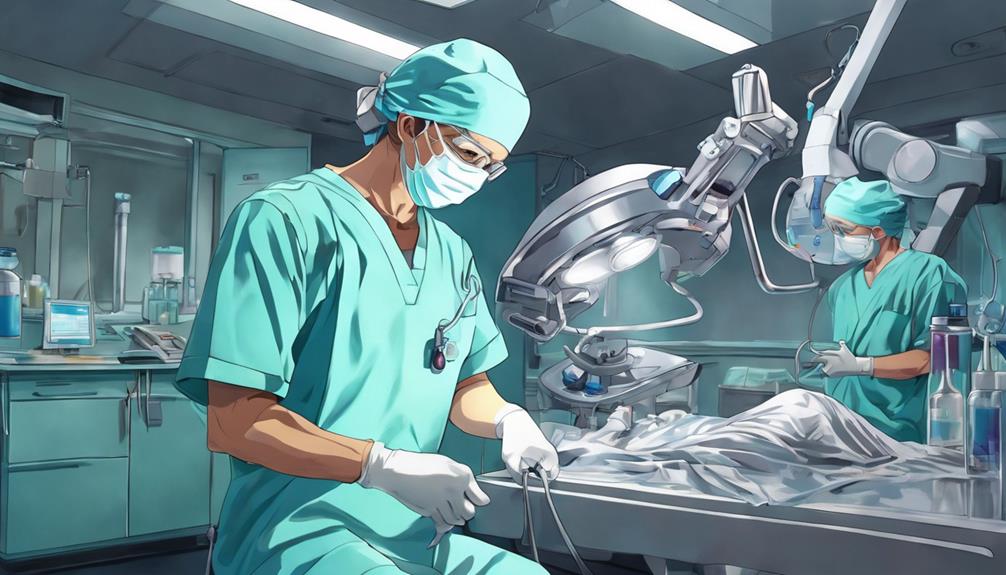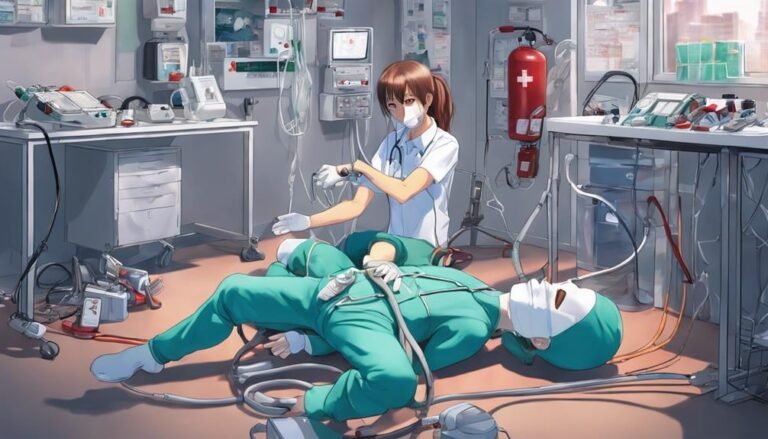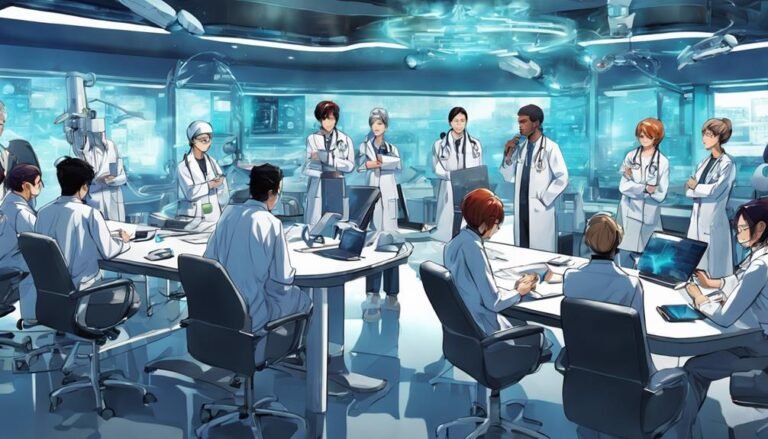How to Be More Proficient in Advanced Medical Procedures
In the fast-paced world of advanced medical procedures, the line between proficiency and excellence can often be blurred. However, by honing your skills through a combination of dedication and strategic approaches, you can elevate your capabilities to unprecedented levels.
But what are the key strategies that can truly set you apart in this dynamic field? Let's explore some essential techniques that could be the game-changer in your quest for mastery.
Key Takeaways
- Embrace continuous learning for skill enhancement.
- Utilize simulation technology for realistic practice.
- Master precision techniques through focused practice.
- Foster interdisciplinary collaboration and evidence-based practices for proficiency.
Importance of Continuous Learning
To excel in advanced medical procedures, continuous learning is imperative for maintaining a position at the forefront of medical advancements. Continuous improvement through lifelong learning guarantees that healthcare professionals remain adept at utilizing the latest techniques, technologies, and treatments available in the medical field.
Lifelong learning involves actively seeking out new information, attending relevant workshops, courses, and conferences, as well as engaging in discussions with peers to exchange knowledge and experiences. By constantly updating your skills and knowledge, you can adapt to the ever-evolving landscape of medical procedures and provide the best possible care to your patients.
Continuous improvement in advanced medical procedures also demands a commitment to self-assessment and reflection. Regularly evaluating your performance, seeking feedback from colleagues, and identifying areas for growth are essential steps in the journey towards proficiency. Embracing a mindset of continuous improvement and lifelong learning will enable you to deliver high-quality care and achieve excellence in advanced medical procedures.
Utilizing Advanced Simulation Technology
You can reap significant benefits by incorporating advanced simulation technology into your medical training.
These simulations provide realistic scenarios that mimic actual healthcare settings, allowing you to practice procedures in a controlled environment.
Through this method, you can enhance your procedural skills and improve your overall proficiency in advanced medical procedures.
Simulation Benefits Healthcare
Utilizing advanced simulation technology in healthcare provides practitioners with realistic training scenarios to enhance proficiency in performing complex medical procedures. These simulations offer a safe environment for healthcare professionals to practice and refine their skills before working with real patients.
The benefits of simulation in healthcare include:
- Enhanced Skill Development: Practitioners can repeatedly practice procedures in a controlled setting.
- Risk-Free Environment: Mistakes made during simulations don't harm actual patients.
- Immediate Feedback: Instant evaluation helps learners identify areas for improvement.
- Team Training: Simulations allow interdisciplinary teams to work together and improve communication and coordination.
Realistic Training Scenarios
Advanced simulation technology provides healthcare practitioners with realistic training scenarios to enhance proficiency in performing complex medical procedures. Scenario-based training allows for the development of critical skills in a controlled environment.
Through real-world simulations, practitioners gain practical experience that mirrors actual clinical settings, preparing them for challenging scenarios they may encounter in their practice. These training scenarios offer a safe space for healthcare professionals to make mistakes, learn from them, and refine their techniques before applying them in real patient care situations.
Enhancing Procedural Skills
To enhance procedural skills efficiently, practitioners can leverage advanced simulation technology. This method offers a controlled environment to practice intricate procedures repeatedly, fostering skill development effectively. Utilizing simulation technology allows for hands-on practice in a risk-free setting, enabling practitioners to refine their techniques without compromising patient safety.
Here are four key benefits of incorporating advanced simulation technology into procedural skill enhancement:
- Realistic Scenarios: Simulations provide realistic scenarios that mimic actual medical procedures, enhancing the authenticity of training.
- Immediate Feedback: Practitioners receive immediate feedback on their performance, allowing for adjustments and improvements in real-time.
- Repetition: The ability to repeat procedures in simulations helps in reinforcing muscle memory and procedural steps.
- Complex Skill Mastery: Advanced simulation technology enables practitioners to master complex skills through interactive and immersive training experiences.
Mastering Precision Techniques
Enhancing your skills in precision techniques is essential for mastering advanced medical procedures. Achieving precision mastery and continuously refining your techniques are key aspects of developing advanced skills and procedural expertise. To excel in precision techniques, focus on attention to detail, steady hand movements, and thorough understanding of anatomical structures.
To help you visualize the importance of mastering precision techniques, refer to the table below:
| Key Aspects | Description |
|---|---|
| Attention to Detail | Focus on minute particulars |
| Steady Hand Movements | Maintain stability and control |
| Anatomical Knowledge | Understand structures deeply |
| Practice | Regularly hone your skills |
| Feedback | Learn from evaluations |
Enhancing Communication Skills
To excel in advanced medical procedures, you must hone active listening skills and practice clear, concise communication.
Active listening involves fully concentrating on what's being said, comprehending the information, and responding thoughtfully.
Clear and concise communication guarantees that critical medical instructions are understood and followed accurately.
Active Listening Skills
Improving communication skills through active listening is essential for mastering advanced medical procedures. When engaging in active listening, focus on the speaker's words, tone, and body language to enhance understanding. Here are four key points to ponder:
- Enhancing Retention: Actively listening helps you retain important information shared by patients, colleagues, and instructors.
- Building Rapport: By listening attentively, you show respect and empathy, strengthening your relationships within the medical team and with patients.
- Clarification: Ask relevant questions to make sure you have a clear understanding of the information being communicated.
- Feedback: Provide feedback to the speaker to confirm your understanding and convey active engagement in the conversation.
Clear and Concise Communication
Active listening skills lay a solid foundation for effective communication in the medical field, a cornerstone for clear and concise communication. Improving teamwork hinges on effective communication practices that secure information is accurately conveyed and understood.
In healthcare settings, clarity is paramount to prevent errors that could compromise patient safety. Utilizing structured communication techniques such as SBAR (Situation, Background, Assessment, Recommendation) fosters a systematic approach to information exchange. Succinctly conveying critical details guarantees that all team members are on the same page, enhancing collaboration and decision-making.
Avoiding jargon and using simple language can prevent misunderstandings and promote efficient communication. By prioritizing clear and concise communication, healthcare professionals can streamline processes, reduce errors, and ultimately improve patient outcomes.
Embracing Multidisciplinary Collaboration
Collaboration across multiple disciplines is essential for enhancing proficiency in advanced medical procedures. In the medical field, embracing multidisciplinary collaboration fosters a holistic approach to patient care and improves outcomes.
To optimize this collaboration, consider the following:
- Interdisciplinary Teamwork: Encourage healthcare professionals from various specialties to work together, leveraging their unique expertise for thorough patient care.
- Collaborative Learning: Create opportunities for continuous education and skill-sharing among different disciplines to enhance knowledge and promote a culture of learning.
- Effective Communication: Utilize clear and concise communication channels to assure seamless information exchange between team members, reducing errors and improving efficiency.
- Respect for Diverse Perspectives: Value the input of all team members, regardless of their discipline, fostering a respectful environment where diverse viewpoints are considered in decision-making processes.
Implementing Evidence-Based Practices
To enhance proficiency in advanced medical procedures, the implementation of evidence-based practices is paramount for ensuring peak patient outcomes. Research-based innovations and training are essential components of evidence-driven performance improvement. By integrating the latest research findings into your medical practice, you can optimize patient care and stay at the forefront of medical advancements.
| Benefits of Implementing Evidence-Based Practices | Examples |
|---|---|
| Enhanced patient outcomes | Utilizing new surgical techniques based on recent studies |
| Improved quality of care | Administering medications following evidence-based guidelines |
| Increased efficiency in medical procedures | Implementing protocols proven to reduce complications |
| Better decision-making processes | Using evidence-based algorithms for treatment planning |
Prioritizing Patient Safety
Prioritize patient safety by meticulously adhering to established protocols and guidelines based on the latest evidence-based research in advanced medical procedures. Patient-centered care and risk management are essential components in ensuring the safety and well-being of those under your care.
To enhance patient safety and quality of care, focus on the following key aspects:
- Adherence to Protocols: Strictly follow standardized protocols and guidelines to minimize errors and risks during advanced medical procedures.
- Continuous Monitoring: Regularly monitor patients' vitals and responses to interventions to identify any deviations promptly.
- Team Communication: Foster clear and effective communication within the healthcare team to coordinate care and address safety concerns efficiently.
- Quality Assurance: Implement quality improvement initiatives to evaluate outcomes, identify areas for enhancement, and optimize patient safety practices.
Seeking Mentorship and Feedback
In advancing your proficiency in advanced medical procedures, actively seek mentorship and feedback from experienced practitioners to refine your skills and enhance patient care outcomes. Mentorship support is invaluable in providing guidance, sharing knowledge, and offering constructive criticism to help you grow professionally. Engaging in a feedback loop is essential for the continuous improvement process, allowing you to identify areas for enhancement and measure your progress over time. Constructive feedback from mentors and peers can pinpoint specific areas needing development, leading to targeted skill refinement and increased competency in performing complex medical procedures. By actively seeking mentorship and feedback, you demonstrate a commitment to lifelong learning and a dedication to delivering high-quality care to your patients. Embrace the opportunity to learn from others in the field, absorb their expertise, and apply their insights to elevate your practice to new heights.
| Mentorship Support | Constructive Criticism | Feedback Loop |
|---|---|---|
| Guidance from experienced practitioners | Specific areas for improvement | Continuous improvement process |
| Knowledge sharing | Targeted skill refinement | Progress evaluation |
| Professional growth | Enhanced competency | Skill enhancement |
Conclusion
To sum up, by continuously learning and utilizing advanced simulation technology, mastering precision techniques, enhancing communication skills, embracing multidisciplinary collaboration, implementing evidence-based practices, prioritizing patient safety, and seeking mentorship and feedback, you can become more proficient in advanced medical procedures.
Just as a skilled surgeon carefully navigates through intricate anatomical structures, you too can navigate through complex medical procedures with precision and expertise.
Aim for excellence in your practice to achieve best patient outcomes.







